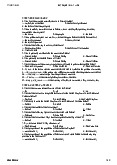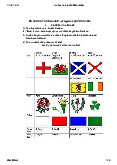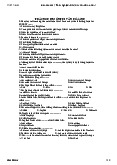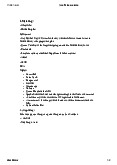




Preview text:
17:39 7/8/24
đề-cương-theo-form-đề-thi-VHA-Part-5-là-2 12-câu-tự-luận-ngắn I.
Decide if the following statements are true (T) or false (F) in Britain.
1. About 1/5 of the total population of UK lives in the Greater London area. T
2. In Britain, most people live in the countryside rather than in towns or cities. F
3. Britain has both “restaurant culture” and a “café society”. F
4. The capital of Northern Ireland is famous for the manufacture of linen. T
5. The lower chamber is known as the House of Lords. F
6. Most school children in Britain go to public schools. F
7. In Britain, the west has more rain than the east. T
8. Most public holidays occur either just before or after a weekend. T
9. The word “Parliament” was first used in England in the 12th century. F
10. The UK lies on the northwest coast of Europe. T
11. Hadrian’s wall was built in the Germanic period. F
12. In Britain, children go to nursery schools at the age of 3. F
13. Britain and good food are two things which are not commonly associated. T
14. Central government can decide the programme of learning as well as materials that should be used in schools. F
15. Schools funded by the government are called state schools. T
16. Banks holidays are always connected with religious celebrations. F
17. Most of the population of Scotland live in the central plain. T
18. Going to restaurant is a popular event for most British people. F
19. Queen Elizabeth II came to the throne when she was 25. F
20. The non-native British include both the white non-English and the non-whites. T
21. Most of the English have a full traditional breakfast with many courses. F
22. There are only Christianity religions in the UK. F
23. British people pay a lot of attention to food and drink. F
24. Most people live in the countryside than in the city. F
25. Nothing becomes British law without the Monarch’s signature. T
26. The UK has only two political parties. T
27. The longest river in Britain is The River Thames. F
28. Northern Ireland was the last to be incorporated into the UK. T
29. English people today drink more tea than coffee. F
30. The British work more hours per week than people do in other European countries. F
31. England is the land of tradition at all levels of life. F
32. The first underground railway system in the world was in London. T
33. All television channels have advertisements. F
34. The English want to change to drive on the right like many other countries. F
35. There are more people working in manufacturing industries than in service industries in Britain. F about:blank 1/5 17:39 7/8/24
đề-cương-theo-form-đề-thi-VHA-Part-5-là-2 12-câu-tự-luận-ngắn
36. The House of Lords is the most powerful and decides national policy. F
37. If you hold a British passport, you are from England, Scotland, Wales or the Republic of Ireland. T
38. British people use the metric system. F
39. Good British food can be easy to find throughout G.B. F
40. A detached house is the most desirable dwelling place to live in for most of the British people. T II.
Choose the correct answer among A,B,C and D.
1. Which is NOT a public holiday in Britain? A. Christmas B. New Year Day C. Spring Bank holiday D. Halloween
2. In British attitude, the house is ……… A. nation B. “home” C. land D. investment.
3. What are the main parts of the British Parliament? A. The House of Commons
B. The House of Lords, the House of Commons, the Queen
C. The House of Lords, the House of Commons D. None is correct
4. Which is the role of the monarch?
A. Giving royal assent to the bill
B. Choosing anyone she likes to be PM C. Giving a veto to a bill
D. Stopping the government going ahead with any of its policies
5. Which is NOT a symbol of England? A. Rose B. Lion C. Red dragon D. Double decker
6. The United Kingdom is made up of …..
A. England, Scotland and Wales.
B. England, Scotland, Wales and Northern Ireland.
C. Great Britain and Ireland.
D. England, Scotland, Wales and Southern Ireland. about:blank 2/5 17:39 7/8/24
đề-cương-theo-form-đề-thi-VHA-Part-5-là-2 12-câu-tự-luận-ngắn
7. Children in Northern Ireland must attend school between what ages? A. 4-15 B. 5-15 C. 4-16 D. 5-16
8. What characterizes a popular newspaper? A. less print
B. interested in private life C. a lot of pictures D. all of them
9. Where would a Britons hate to live in? A. detached houses B. semi-detached houses C. terraced houses D. flats
10. Where would a Britons go to eat out? A. English typical restaurants B. French restaurants
C. Chinese or Indian restaurants D. both B and C III.
Match a line in column A with a line in column B A B 1. The Roman B
a. Small-scale invasion but much influence; beginning of 2. The Norman A the English class system 3. The Anglo-Saxon D
b. Long occupation but leaving little behind; colonial 4. British Empire C
control rather than large scale-settlement 5. Common Wealth S
c. The empire on which the sun never sets 6. Vikings H
d. Great effect on the countryside; new farming methods; 7. UK O
and self-sufficient villages forming the basis of English 8. Stonehenge E society 9. Robin Hood Q
e. One of the most famous and mysterious archaeological 10. French M
sites in the world, built on Salisbury Plain 11. The Civil War G f.
Built by the Romans in the second century in order to 12. The Great Fire R
protect their territory from attacks by the Scots and the 13. Queen Victoria P Picts 14. The Coronation T
g. A contest between The Cavaliers and The Roundheads 15. Hadrian’s Wall F
h. Slight cultural differences; similarities made political 16. Queen Elizabeth K unification easier 17. The Celts N i.
The tartan kilt is the national wearing 18. Scotland I j.
Seafaring north Germanic people who raided, traded, 19. The Danish J
explored, and settled in wide areas of Europe and the 20. Parliament
North Atlantic islands from the late 8th to the mid-11th Common We L centuries k. The virgin queen about:blank 3/5 17:39 7/8/24
đề-cương-theo-form-đề-thi-VHA-Part-5-là-2 12-câu-tự-luận-ngắn l.
It has two Houses: House of Commons and House of Lords
m. The official language in the Norman Conquest
n. Considered to be the native inhabitants living in the British Isles o. Great Britain
p. This Queen became a popular symbol of Britain's success in the world
q. A legendary folk hero, stealing from the rich and giving to the poor r.
This incident destroys most of old London
s. An intergovernmental organisation of 53 member states
that were mostly territories of the former British Empire. t.
This event took in 1953 and Elizabeth, aged 25 ascended the thrones IV.
Fill in each gap in the following sentences with suitable words.
1. Britain is a …constitutional………… monarchy.
2. The British pub is short for …public house…………
3. Because of the high prices, British people often buy their houses through …
mortgage…………. system.
4. The politicians in the governing party usually become members of the …parliament…………
5. One of the British New Year customs is singing of the song …Auld Lang Syne……………
6. The least desirable home in Britain is a …flat………….
7. The most prestigious accent in Britain is …Received Pronunciation (RP)………….
8. …The East End……………. is known as the poorer residential area of central London.
9. The schools which had been used in the 19th century to educate the sons of the upper and upper-
middle classes are called …public school…………..
10. God save the Queen………………… is the British national anthem.
11. The important thing of a house is to feel … …… cosy
12. The biggest wave of Germanic invasion is ……Anglo-saxon……..
13. Universities normally select students on the basis of a level………… results and an interview.
14. Cities in England and Wales have been built outwards rather than …upwards…………
15. …Cockney……… is a strong London accent and is associated with working class origins.
16. The third largest city in Britain is Glasgow……….., which is an industrial city in Scotland.
17. John Bull……………… is a fictional character who is supposed to personify Englishness and certain English virtues.
18. Despite their long occupation of Britain, The Romans……… left very little behind.
19. Many of the members of the House of Lords are not elected-known as………….. peers.
20. Stonehenge………… , built on Salisbury Plain, is one of the most famous and mysterious
archaeological sites in the world.
21. The official full name of the UK is ...The United Kingdom of Great Britain and Northern
Ireland................. about:blank 4/5 17:39 7/8/24
đề-cương-theo-form-đề-thi-VHA-Part-5-là-2 12-câu-tự-luận-ngắn
22. One reason why the English don’t want to drive on the right is that they like to
be .......different..............
23. A strong London accent is described as the ...Cockney...................
24. The UK is a ...constitutional.............. monarchy.
25. It is also a .parliamentary................... democracy.
26. Hadrian’s Wall was built by the .Romans................ in the second century.
27. The weather in Britain is described as ..changeable weather...................
28. Because of ethnic .identity................, the Scottish may get angry when people address as English.
29. The popular newspapers are also known as ....tabloids.....................
30. In the House of .commons................., its design and layout differ from the interior of the
parliament buildings in most other countries.
31. The Celts................... were the first inhabitants in the British Isles.
32. .The Queen................ opens Parliament.
33. The Union Jack is the national ....flag............ of the UK.
34. The ..urban............... area occupies up to 75%.
35. Scottish men are proud to wear ..the kilts................. which is a pleated skirt.
36. In ..reality......................, The Monarch has no role.
37. The national press does not belong to any ....region...........................
38. Leek/Daffodil………………. is the national flower of Wales.
39. Smog in Britain is a sign of ...air pollution................... 40. There were four major .
................. in the British history: The Roman, The invasions Anglo-
Saxon, The Danish, and The Norman. about:blank 5/5



